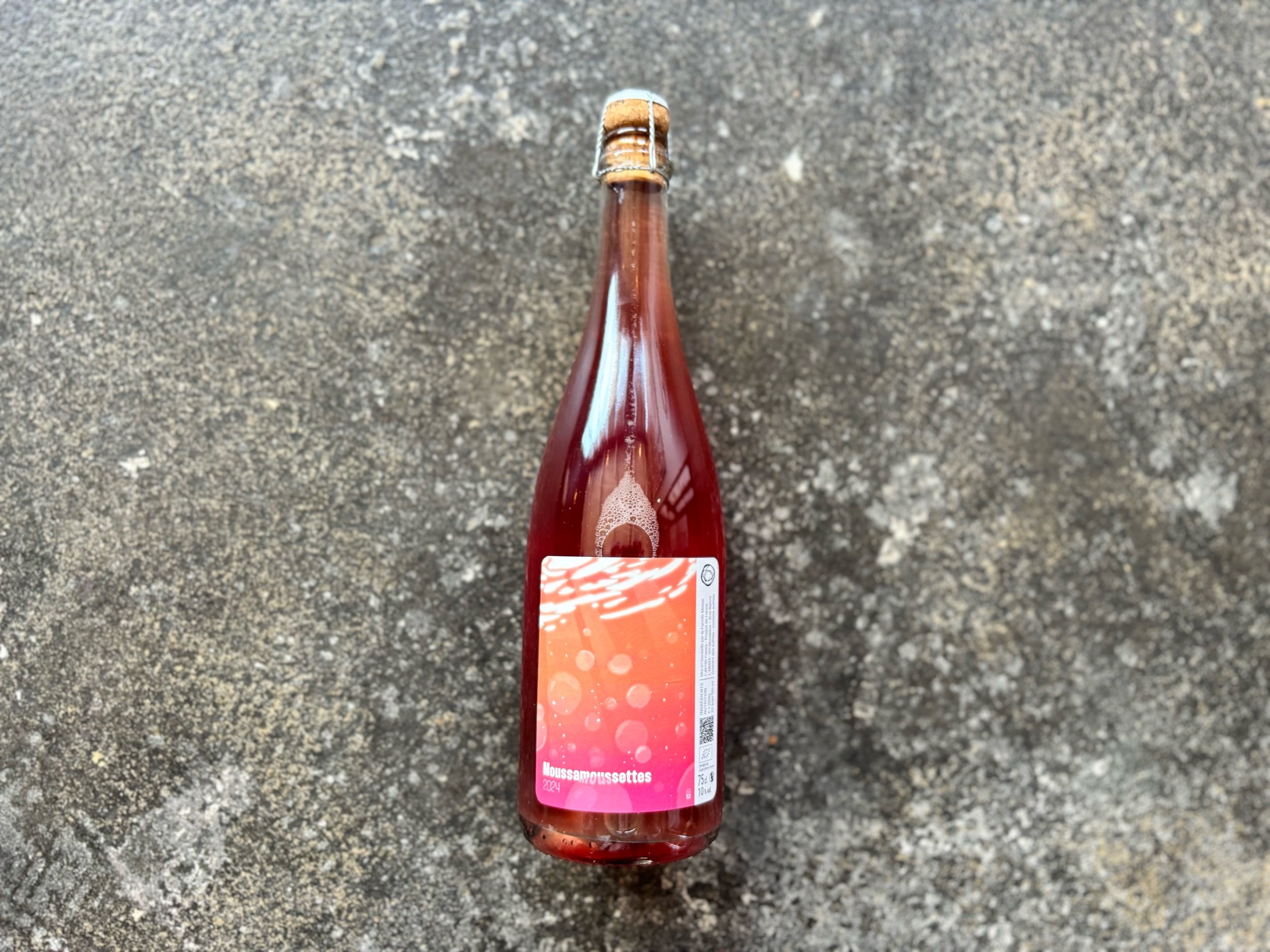 Image 1 of 1
Image 1 of 1


Domaine Mosse ‘Moussamoussettes’ Pétillant Rosé NV (2024)
Location: France, Loire
Winemaker: Agnès, René, Sylvestre and Joseph Mosse
Grapes: Mostly Grolleau Gris, Pineau d’ Aunis, one week skin contact Cabernet Franc
Soil: Clay
Winemaking: The grapes are direct pressed, then the juice partially ferments in stainless steel, bottled with a crown cap. The fermentation continues inside of the bottle and the trapped CO2 creates the wine's natural effervescence. Each bottle is manually disgorged then resealed with a Champagne cork.
From us at M&L: Endearing and joyous, ‘Moussamoussettes’ has been a shop favorite no matter the time of year; drink with loved ones and revel in its pure pink fruit and wooly textures.
From the Importer Louis/Dressner: Agnès and René Mosse, along with their sons Joseph and Sylvestre, live and work in the village of St-Lambert-du-Lattay, a village in the Coteaux-du-Layon area of Anjou. Layon is a small tributary to the Loire that lazily digs its way through well exposed and drained hills of schist and sandstone. Its micro-climate allows for a long hang-time, and when the mornings are foggy in the fall, with no rain, botrytis develops easily on the Chenin grapes.
Before becoming vignerons, the Mosse had owned a wine-bar/retail shop hybrid in Tours. They credit the great vignerons they met there, among them Jo Pithon and François Chidaine, as the impetus to become winemakers. The couple studied viticulture and oenology at the agricultural lycée in Amboise where two of their teachers were Thierry Puzelat (Clos du Tue-Boeuf) and Christian Chaussard (Domaine le Briseau).
After graduating, the Mosse spent two years working in Côte-de Beaune before buying their estate in St-Lambert in 1999. They currently work 17 hectares of vines, most of them planted with Chenin Blanc, and Cabernet Franc, the rest planted with Gamay, Chardonnay, Grolleau Gris and Noir.
They adopted organic viticulture techniques from the start, plowing between and under the rows, and use biodynamic preparations to treat the vines and soil. In their area of "Anjou Noir" (Black Anjou, so called because of the dark color of the soils of slate and volcanic rocks), the soils are shallow, with subsoils of schist and sandstone, and varying amounts of clay on the surface.
With all the efforts put into vineyard work, it is equally important to them to vinify in a natural fashion, and they are particularly attentive to minimizing manipulations and the use of sulfur. All the wines are barrel-fermented and aged. The whites usually go through their malolactic fermentation. The barrels are renewed as needed, but are always older as to not impart oak flavors.
Location: France, Loire
Winemaker: Agnès, René, Sylvestre and Joseph Mosse
Grapes: Mostly Grolleau Gris, Pineau d’ Aunis, one week skin contact Cabernet Franc
Soil: Clay
Winemaking: The grapes are direct pressed, then the juice partially ferments in stainless steel, bottled with a crown cap. The fermentation continues inside of the bottle and the trapped CO2 creates the wine's natural effervescence. Each bottle is manually disgorged then resealed with a Champagne cork.
From us at M&L: Endearing and joyous, ‘Moussamoussettes’ has been a shop favorite no matter the time of year; drink with loved ones and revel in its pure pink fruit and wooly textures.
From the Importer Louis/Dressner: Agnès and René Mosse, along with their sons Joseph and Sylvestre, live and work in the village of St-Lambert-du-Lattay, a village in the Coteaux-du-Layon area of Anjou. Layon is a small tributary to the Loire that lazily digs its way through well exposed and drained hills of schist and sandstone. Its micro-climate allows for a long hang-time, and when the mornings are foggy in the fall, with no rain, botrytis develops easily on the Chenin grapes.
Before becoming vignerons, the Mosse had owned a wine-bar/retail shop hybrid in Tours. They credit the great vignerons they met there, among them Jo Pithon and François Chidaine, as the impetus to become winemakers. The couple studied viticulture and oenology at the agricultural lycée in Amboise where two of their teachers were Thierry Puzelat (Clos du Tue-Boeuf) and Christian Chaussard (Domaine le Briseau).
After graduating, the Mosse spent two years working in Côte-de Beaune before buying their estate in St-Lambert in 1999. They currently work 17 hectares of vines, most of them planted with Chenin Blanc, and Cabernet Franc, the rest planted with Gamay, Chardonnay, Grolleau Gris and Noir.
They adopted organic viticulture techniques from the start, plowing between and under the rows, and use biodynamic preparations to treat the vines and soil. In their area of "Anjou Noir" (Black Anjou, so called because of the dark color of the soils of slate and volcanic rocks), the soils are shallow, with subsoils of schist and sandstone, and varying amounts of clay on the surface.
With all the efforts put into vineyard work, it is equally important to them to vinify in a natural fashion, and they are particularly attentive to minimizing manipulations and the use of sulfur. All the wines are barrel-fermented and aged. The whites usually go through their malolactic fermentation. The barrels are renewed as needed, but are always older as to not impart oak flavors.
